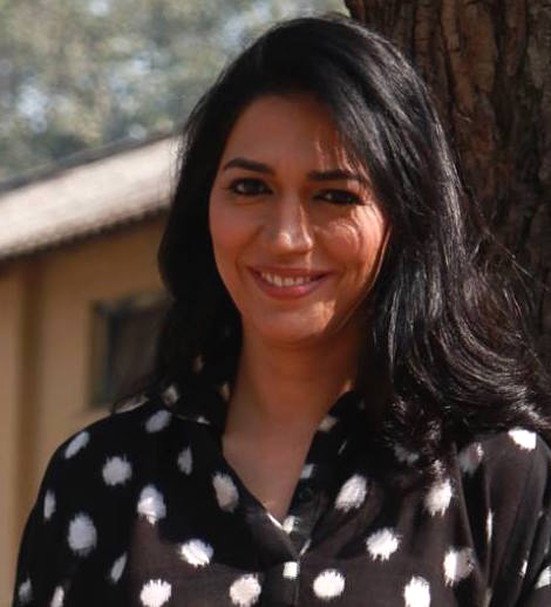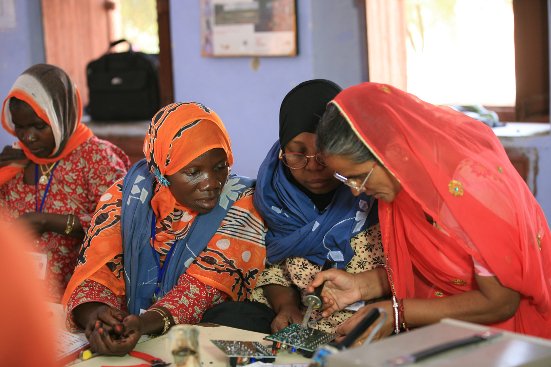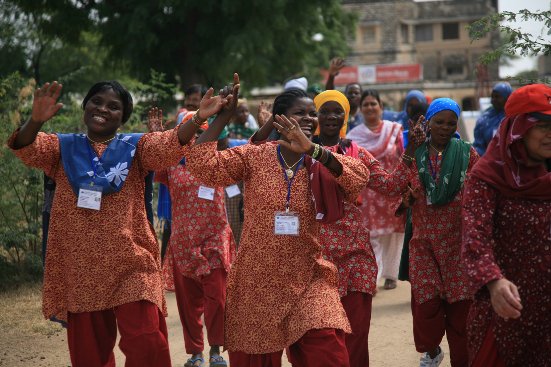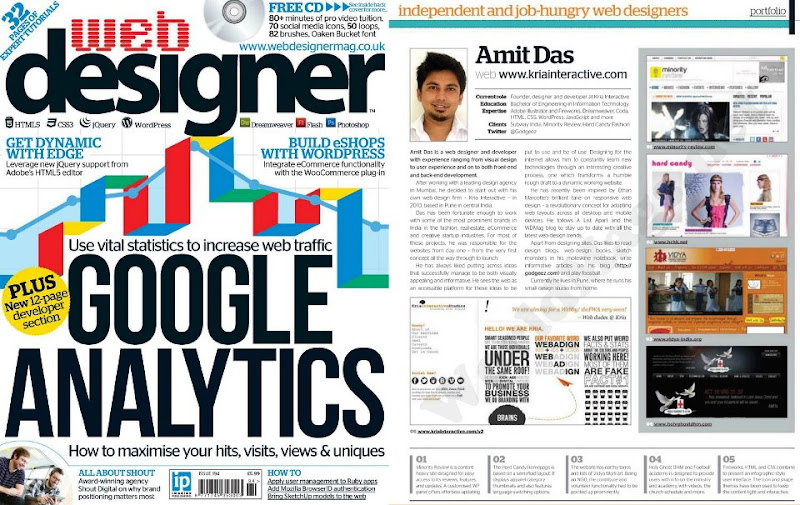
Yasmin Kidwai is a filmmaker who made the film No Problem: Six Months with the Barefoot Grandmamas. It is about pre-literate rural African women who have come to Rajasthan to become solar engineers in six months at the Barefoot College of Engineering. The film has won several international awards including at the River to River Florence International Film Festival and the Zonta Film Festival. Minority-Review’s Swati Sharan gives us a glimpse into Yasmin, her film and the world of documentaries.
Hi Yasmin, tell us something about your background?
I started out studying journalism. And then I studied film production at Mumbai’s St. Xavier’s. And thereafter I worked in television and went into documentaries fairly quickly in my career.
So then how did you get into this particular project, No Problem?
Over the last few years, I have been working in the field of development. And I was researching a project for the government in the state of Rajasthan, which is where I came across this subject. This was a project of teaching illiterate African grandmothers. I was very curious about it and that’s how the first step started.

Scene from the documentary
How viable a career do you find documentary filmmaking?
You know there are two ways of looking at a career. It’s either what you are or what you do. For a documentary filmmaker, it essentially becomes about what you are. It’s very difficult to differentiate between work and yourself. So I don’t think I followed a very clear career path. As a documentary filmmaker, you do get pulled in certain directions. So I think it has alot to do with who you are.
It’s argued that being a documentary filmmaker is not a financially viable career. Do you think that’s the case?
That’s exactly what I am saying. It depends on what you want and how much you want from it? I am definitely not on the streets. But am I am making as much as a top executive in a television channel? No, of course not. But do I enjoy the work I am doing? Yes, absolutely. About 15 years ago, I was at a point where I was offered a very high paying job at a television channel, which I hated. And I thought if I was going to be miserable doing what I do, then what was the point of choosing this field in the first place?

Yasmin Kidwai and Jackie Shroff
So is there some kind of guideline you would like to give people who are going into the documentary field?
It’s not that you can’t make money making a documentary. But the only advice I would give somebody entering the field is to make sure you love research and that you can work long and hard and in as part of a team. You don’t make a film alone. See, often I find people who want to get into the field want to skip steps 1 to 10 and go to step 20. That doesn’t happen. I think a documentary especially requires a strong love and commitment to research and a lot of patience.
Some may argue that when these documentaries get made, what you may be showing may be encouraging. But is it reaching the people who can benefit from that change?
That’s been a challenging area until now. Now I don’t know if in the west, the documentaries are reaching the subject. But they are reaching the audiences who could make the difference. So in this way, they do create a large amount of awareness and empathy. In India, documentaries are getting into the mainstream conversations. Even 5 years ago, if you said you were making documentaries, people would look at you like you were some poor social outcast. With No Problem, we are on the verge of launching a big impact and access program in India. Our actual idea is to use the film to make a difference, which means we want to use the film to help get electricity in the 18,000 villages in India that don’t have electricity. And we want to do it via women and the communities. We have very interesting partners from the government, the corporate sector and the NGO sector all getting on board. I am giving 7 years of my life to be able to actually use the film to help reach the people where this can actually make a difference.
You can make a film but can you be held responsible as one person for spreading knowledge to 18,000 villages?
I totally can’t do it alone. I was toying and struggling with this idea for a year. And luckily, I am getting a team that is coming on board. And what is required by the filmmaker in this case is commitment. I don’t think a documentary can be used as effectively without a filmmaker getting involved. I have also been guilty in the past of making a film and then just saying, ‘I’ve done my bit’.
Perhaps in this case I actually feel it is possible to make a difference in the lives of these women. Making an impact on women is great fun. It’s like when you change the woman’s life, you change the life of the family. You totally change the community she is a part of.

Scene from the documentary No Problem: Six Months with the Barefoot Grandmamas
What do you think of a filmmaking system where one person is expected to play multiple roles when making a film?
It’s a big problem. I think as filmmakers perhaps we are to blame for it. It’s that we don’t value ourselves. And this is fine in the beginning when you are starting out in your career. I’ve done films for a couple thousand rupees when I started off. I’ve done films for free. But like even now, when I talk of giving 7 years to this project, people expect you will do it free. But free is not sustainable. I think alot of times in the creative field, it’s also undervalued till it’s a measurable success. And I think as filmmakers, we ourselves have to change it. Because when you put your own value down, others will too and will accept that value.
As for multiple roles, I think everyone brings their own to the table. It is very difficult to produce and direct at the same time. Both require one’s mind to be in different directions. But what can I say? Only we can change it. It’s a trend which I’ve seen happening even more now. Even when young people come to us to get hired, they’ll say we can do everything. And maybe because at a lot of these television channels coming up, you get hired for qualities like this, especially with the internet opening up. But I think it’s unfair on the people who are doing this. These people are not able to develop any one field fully. Personally, if a person said I can do everything, I would not hire them. Because that means you’re completely below average in everything. In India, there are over 50,000 new channels where they’re paying these kids who are supposed to do everything. They work them 22 hours a day. After 6-8 months of this, most of the people leave the media. You can’t cope with something like that. But I guess as people who are doing the hiring, we should be saying no to this. And if you’re looking for quality, a documentary is a standalone film. So you can’t have substandard material in a documentary.
So do you think the idea of having a celebrity endorsement for these documentaries is helping the cause in India?
Celebrity endorsements can get you one newspaper picture. It cannot do more than that unless the celebrity becomes involved in it. So I am really against getting celebrities for the sake of it. We are looking for champions instead who believe in that cause. So in that sense, Jackie Shroff came on to our project. He has promised to go the 7-year mile with us. He has promised to send women from his village to the Barefoot College of Engineers. And he was also very happy to give land for a Barefoot College to come up there. He’s trying to support us for reaching our goal of 20,000 women becoming solar engineers.

Jackie Shroff and Yasmin Kidwai
So if a common person wants to get involved in your cause, how can they do that?
At this point, a person could come on board by sponsoring an illiterate grandmother’s study at the Barefoot College. If you can’t sponsor her 6-month study, you can sponsor her stay. Or you could sponsor her ticket to go there. We’re going to break down costs like that. Or you could support it by spreading the word or holding a screening for 10 friends in your drawing room or by sharing it on 10 people’s social media page or writing an article about us. It’s not just about money. You could support us with your belief.
So how can people arrange for screenings in their home?
It’s available free online at https://youtu.be/GH6b3fRJmMc. We would just like to know where people are arranging for the screening and if people would like us to facilitate it, we would be happy to do that too. Our email is springboxfilms@gmail.com.




0
comments